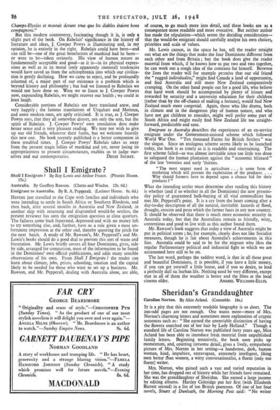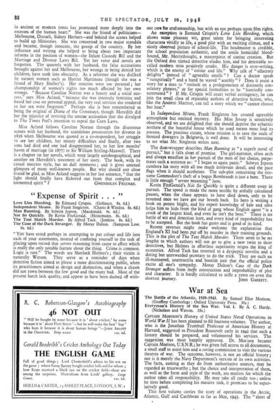Sheridan's Granddaughter
Caroline Norton. By Mice Arland. (Constable. 16s.) IT is a pity that this extremely readable biography is so short. The zoo-odd pages are not enough. One wants more—more of Mrs. Norton's charming letters and sometimes more explanation of cryptic sentences such as : "She earned the unenviable distinction of having the flowers snatched out of her hair by Lady Holland." Though a standard life of Caroline Norton was published forty years ago, Miss Acland has been able to introduce fresh material from unpublished family letters. Beginning tentatively, the book soon picks up momentum, and, omitting tiresome detail, gives a lively, sympathetic picture of Mrs. Norton in her setting—a handsome, dark, buxom woman, kind, impulsive, extravagant, extremely intelligent, liking men better than women, a witty conversationalist, a fluent (only too fluent) writer.
Mrs. Norton, who gained such a vast and varied reputation in her time, has dropped out of history while her friends have remained. She was the granddaughter of Sheridan. She earned a large income by editing albums. Hartley Coleridge put her first (with Elizabeth Barrett second) in a list of ten British poetesses. Of one of her four novels, Stuart of Dunleath, the Morning Post. said : "No writer
in ancient or modern times has penetrated more deeply into the recesses of the human heart." She was the friend of politicians— Melbourne, Disraeli, Sidney Herbert—and behind the scenes helped to build up Ministries. She was concerned in two major scandals and became, though innocent, the gossip of the country. By her influence and writing she helped to bring about two important reforms in the position of women—the Infant Custody Bill and the Marriage and Divorce Laws Bill. Yet her verse and novels are forgotten. The quarrels with her husband, the false accusations brought against her and Melbourne, her wrongs in being denied her children, have sunk into obscurity. As a reformer she was disliked by earnest women such as Harriet Martineau (though she was a friend of Mary Shelley's). Her outcries were too personal ; her championship of women's rights too much affected by her own wrongs. "Because Caroline Norton was a beauty and a social suc- cess," says Miss Acland, "because she was intensely feminine and based her case on personal appeal, the very real services she rendered to her sex were forgotten." Perhaps she is best remembered as being the original of Diana of the Crossways, though Meredith did her the injustice of reviving the untrue accusation that she divulged to The Times Peel's intention to repeal the Corn Laws.
Miss Acland follows Caroline Norton through the disastrous scenes with her husband, the scandalous prosecution for divorce in 1836 when Melbourne was quoted as a co-respondent, her struggle to see her children, her money difficulties and finally, after two sons had died and one had disappointed her, to her few months' haven of marriage (in 1877) to Sir William Stirling-Maxwell. There is a chapter on her novels, which were largely autobiographical, and another on Meredith's treatment of her story. The book, with its casual staccato style, has no dull mbments ; and it gives unusual glimpses of many well-known people. But why should any close friend be glad, as Miss Acland suggests in her last sentence, "that the light should finally have flickered out from that complex and



































 Previous page
Previous page